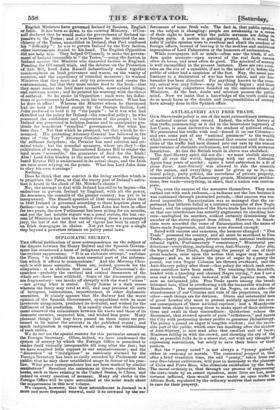DIPLOMATIC SECRECY.
TIM official publication of more correspondence on the subject of the dispute between Sir Henry Bulwer and the Spanish Govern- ment has occasioned a burst of indignant ridicule, on account of the evident suppressions. " It is an elaborate attempt," exclaims the Times, " to withhold the most essential part of the informa- tion which it affects to communicate." And the Morning Chro- nicle is still more sarcastic. There are, indeed, grounds for the allegation : it is obvious that some of Lord Palmerston's de- spatches—probably the cardinal and critical documents of the whole set—have been withheld. Some of the documents given are fragmentary : one breaks off abruptly with the word " states" —not giving what is stated. Every hiatus is a dark recess wherein the fancy may revel at will, and may presume all sorts of intrigues, insinuations, impertinences, or other diplomatic amenities. It plainly appears that Mr. Bulwer had the worst opinion of the Spanish Government, sympathized with its most inveterate antagonists, predicted its downfall,, and wished for the fulfilment of his prediction. It is equally clear that the Govern- ment observed the coincidence between his views and those of its domestic enemies, suspected him, and wished him gone. Many pleasant things that may have passed on these topics are pre- sumed to lie under the asterisks in the published copies ; and much indignation is expressed, on all sides, at the withholding of such titbits.
We do not see the special reasons for this particular assault on the Foreign Secretary. Often, indeed, we have condemned the system of secrecy by which the Foreign Office is permitted to render itself virtually irresponsible till long after the fact ; but we have received little support in our animadversions ; and the " discretion " or " indulgence " so carelessly claimed by the Foreign Secretary has been so easily accorded by Parliament and public, that he may show established usage in favour of his prac- tice. What great correspondence has not been marked by similar mutilations ? Recollect the omissions in divers diplomatic Line books, such as those relating to the United States, to China, aura indeed to every question of moment. Many old clerks in the Foreign Office will be quite astonished at the noise made about the suppressions in this new volume. We suspect, however, that their astonishment is doomed to a more and more frequent renewal, until it be crowned by the en- forcement of some fresh rule. The fact is, that public opinion. on the subject is changing: people are awakening to a sense of their right to know what the public servants are doing in foreign parts. A notion is gaining ground, that it would be safer if public opinion were to overhaul and check the conduct of foreign affairs, instead of leaving it to the reckless and ambitious ingenuities of Lord Palmerston or the humours of ambassadors.
While newspapers tell so much—often near the truth, if sel- dom quite accurate—open avowal of the real facts cannot often do harm, and must often do good. The mischief of secrecy is well exemplified in the present instance. Here are two coua- triea on the eve of a squabble, if not in the midst of it, before the public of either had a suspicion of the fact. Nay, the usual pre- liminary to a declaration of war has been taken, and our Am- bassador has been dismissed. For anything known to the coun- try, actual war may follow—may be already begun ; and there are not wanting conjectures founded on the ominous silence of Ministers. At the best, doubt and mistrust possess the public mind. Now we insist that a knowledge of the truth could not do so much harm as the doubts and irresponsibilities of secrecy have already done in this Spanish affair.


























 Previous page
Previous page